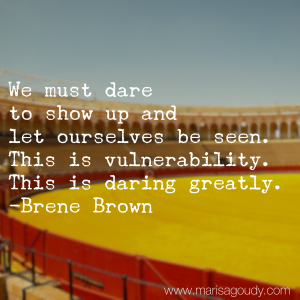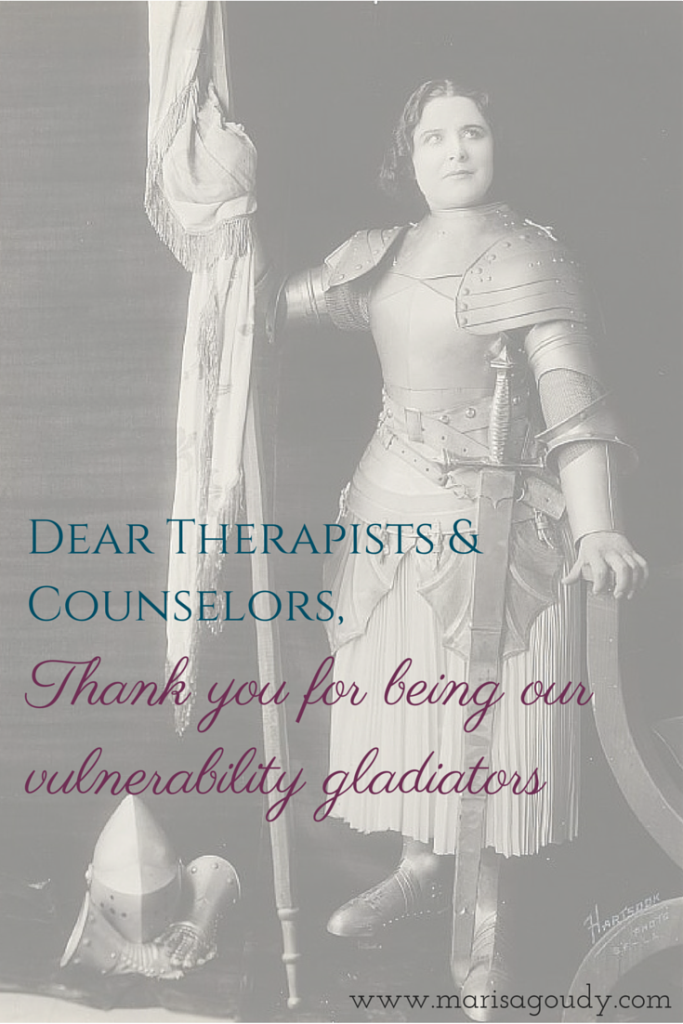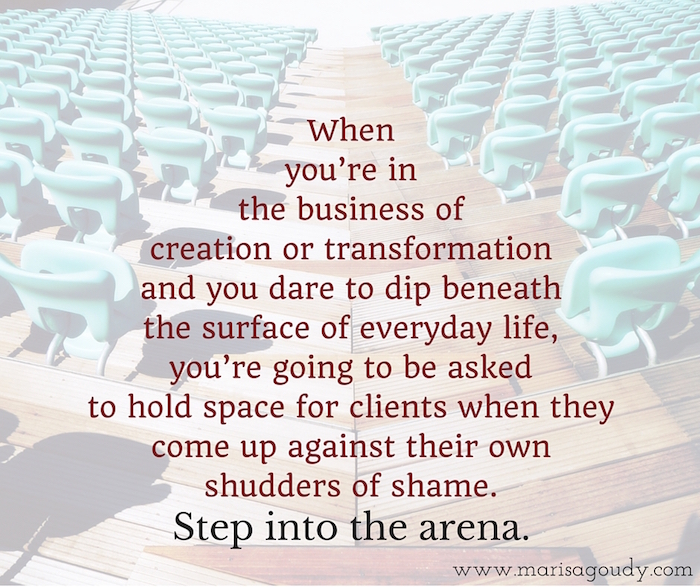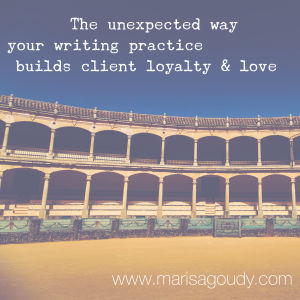
BLOG
“Share what is vulnerable, not what is intimate.”
Share what is vulnerable, not what is intimate - Brene Brown | #365StrongStories by Marisa Goudy | writing coach for therapists, coaches, healers, thought leaders
"I don't share anything until my feelings and growth aren't still dependent on it."
- Brené Brown
A slide with this quote on it lit up the chat box during the recent Story Triangle webinar.
We were deep into our exploration of what makes stories work and what makes them fall flat. At this point in the class, we were talking about how a story loses its balance when you, the writer, get lost in the details of your own story.
It's almost always a struggle, deciding what story elements add depth and what's going too deep.
As I hit publish, I’m grateful to have Brené to look to when I worry “Is this TMI?
After all, when writing is both your private, emotional processing tool and the way you communicate publicly and professionally, it can feel like a tightrope walk.
How do you tell the difference between a rich, compelling story and simply pouring out your guts?
Again, there’s a Brené quote for that. (Isn’t there a BB line for just about everything related to relationships and speaking truth?)
“Share what is vulnerable, not what is intimate.”
Sharing vulnerable stories reveals your humanity and creates connections.

Pouring out the intimate details into a public space where people who aren’t prequalified to hold you in all your glorious imperfection…
At best, you get no response at all. At worst, potential clients judge what they do not understand, turn away, and seek out someone who they believe is more in control of their sh*t.
So how do you tell the difference between the vulnerable stories that are ready for the spotlight and intimacies that need to be held in reserve?
Check in with your own process. Can you say “I’ve healed this” and feel you’re being completely honest with yourself?
Decide why you’re telling the story. Do you have something to teach based on your experiences or do you just need someone to be your witness?
If your answer to #1 is “I haven’t healed this yet,” that’s great. Pull out your journal, call a friend, make sure your on time for your next therapy or healing session.
Do. Not. Blog. This. (Yet.)
If you your answer to #2 is “I need a witness,” embrace this beautifully human moment. Everyone needs to be seen, heard, and understood.” Yes, be fully present in your need to be seen, but do so with the people you know and trust - not your professional audience.
The unexpected way your writing practice builds client loyalty and love
Sovereign Standard, Issue 33 “I feel really vulnerable right now,” she said. “I’ve never showed anyone but my husband a very first draft of my writing.”
“I feel really vulnerable right now,” she said. “I’ve never showed anyone but my husband a very first draft of my writing.”
We have a name to that feeling of being exposed thanks to the brilliant Brené. (Do I even need to mention her last name in this company?)
 As a culture, we’re learning that vulnerability is vital to connection and growth. It’s an essential skill to master if you want to make the world more beautiful, bearable, and bold.
As a culture, we’re learning that vulnerability is vital to connection and growth. It’s an essential skill to master if you want to make the world more beautiful, bearable, and bold.
And yet, actually doing the stuff that puts your vulnerability skills to the test? Well, that’s another story.
Honoring your clients' vulnerability - and bravery
The client I quote above reminded me that sharing your writing - especially what Anne Lamott famously calls the “shitty first draft” - can be a terrifying experience.
Pressing “publish” and sending your words into the public arena isn’t the only thing that’s scary. Just sending it to someone who has earned your trust, like a writing coach, can give you the whim-whams.
Even if you want me to look more deeply at your writing. Even if you want me to question your logic and rework a paragraph that took you 45 minutes to write. Even when you trust me and trust our co-creative writing process, you still may shudder when I say "so, I read your piece..."
Almost everyone wrestles with the writing shame that was instilled in them by dismissive English teachers, unholy nuns, or grammarian grandmothers. I have to remind myself - often - that I’m pushing people into uncomfortable spaces by simply doing my job.
Are you in the vulnerability business too?
My dance with these beloved, vulnerable writers becomes even more complex since my clients themselves are in the vulnerability business.
And some of them never knew it was going to be part of the entrepreneurial ride.
 Therapists & Counselors, thank you for being our vulnerability gladiators
Therapists & Counselors, thank you for being our vulnerability gladiators
Therapists, of course, are schooled in the art and science of vulnerability. You specialize in emotional exposure - and how that tends to make people react or shut down.
Thank goodness we have you, dear counselors! I envision you there doing your brilliant work in the green room of the Daring Greatly "arena.”
Creative Entrepreneurs, you know you have a place in the arena too, right? Suit up!
And then there’s the rest of us creative entrepreneurs who learn from Brené Brown’s books. We look to the thought leaders (and bloggers!) who expose the crazy-sexy-scary underbelly of being alive and putting ourselves out there.
We creative entrepreneurs are not necessarily trained in the intricacies of the human psyche, but we still need to recognize we have a role to play in this arena.
 When you’re in the business of creation or transformation and you dare to dip beneath the surface of everyday life, you’re going to be asked to hold space for clients when they come up against their own shudders of shame.
When you’re in the business of creation or transformation and you dare to dip beneath the surface of everyday life, you’re going to be asked to hold space for clients when they come up against their own shudders of shame.
Support clients in their most vulnerable moments and help them make real, positive change… When you do that, you’re performing a service that’s so much more valuable than whatever you say you do on your website.
When you hold space in that way you’re creating a long term client and a forever fan.
How can you make vulnerability one of your greatest assets?
 If being “that person” who can hold space for a client when she feels most exposed is how you earn the trust that builds a practice and a business, how can you get better at it?
If being “that person” who can hold space for a client when she feels most exposed is how you earn the trust that builds a practice and a business, how can you get better at it?
Start by recognizing what makes you feel vulnerable. Start with what feels risky. Start with your writing.
4 Key Lessons in Vulnerability You Can Learn From Your Own Writing Practice
- Recognize that you are stepping into the arena whenever you publish a blog post. Congratulate yourself for that.
- Realize that showing one focused reader something that you have written may feel a lot harder than sending it to a million faceless internet surfers.
- Acknowledge that your writer’s block is about more than time constraints and a hatred of grammar… it's likely rooted in that tricky mix of “please see me” and “eek! stop looking at me!”
- Notice when you’re asking your readers to be vulnerable. You’ll hone your vulnerability super powers when you become aware of the content that pushes readers out of their comfort zone.
Simply put, when you know your own vulnerabilities more intimately, you’ll be better able to detect them and honor them in others. People love it when you do that, you know. Think you might be ready to entrust me with your stories and your writing practice? Learn more about the writing coaching relationship.
I'll leave you with my favorite working definition of vulnerability by the brilliant Ahri Golden. Soak in these words. Put them into practice.
Vulnerability In the space between you and me Vulnerability is power Vulnerability in the space between you and me Vulnerability is the opposite of weak

